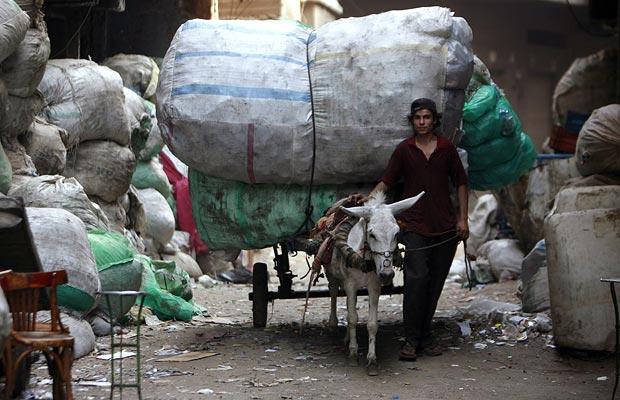CAIRO: In an effort to enhance the protection of human rights among Arab League member states, Secretary General of the London-based rights group Amnesty International Irene Khan visited Cairo on Wednesday to discuss human rights conditions in a number of Middle East and North Africa (Mena) nations with Secretary General of the Arab League, Amr Moussa.
At an exclusive interview with The Daily Star Egypt, Khan expressed concern about the deteriorating human rights conditions amid escalating violence in several areas of the region, stressing the need for the Arab League to “step up for human rights and make the member countries more wary and outspoken of each other’s human rights performance.
She urged the Egyptian government to improve the human rights climate in the country especially since Egypt recently elected to join the United Nations Human Rights Council.
“I had a good meeting with Mr. Moussa today and I hope that our discussion will inspire the Arab League to take on a stronger role in the field of human rights in the region, Khan told The Daily Star Egypt.
She added that the meeting with Moussa mainly evolved around the state of human rights in Sudan, Somalia, Lebanon, and the Occupied Palestinian Territories, with the issue of the ongoing genocide in Sudan’s Darfur region topping the agenda.
To help put an end to the human rights atrocities in Darfur where more than 200,000 people have lost their lives and 2.5 million have been displaced, Khan called for multinational efforts to pressure the Sudanese government into allowing the deployment of a UN peacekeeping force in Darfur.
“Stronger international cooperation is essential to end human rights violations in Darfur, she said.
Khan argued that Sudan is violating the UN arms embargo by conducting illegal weapons transfers of Chinese and Russian arms into Darfur, fueling the bloodshed.
“There must be a tightening of this embargo, putting the end to supply of weapons to Sudan, Khan argued.
The Arab League must also take stronger action in Somalia, Khan said, where recent political violence has cost the lives of many.
In regards to Lebanon, a country currently witnessing deteriorating human rights conditions on the eve of political unrest and faction fighting, Khan said that Amnesty was “deeply concerned over the political crisis, stressing the need for addressing the issue of impunity in the country.
In regards to Lebanon, a country currently witnessing deteriorating human rights conditions on the eve of political unrest and faction fighting, Khan said that Amnesty was “deeply concerned over the political crisis, stressing the need for addressing the issue of impunity in the country.
“Accountability for serious past crimes in Lebanon needs to be implemented immediately, including last summer’s war and the [assassinated former PM Rafik] Hariri’s tribunal. It is of utter importance to the country, she said.
According to Amnesty officials, the organization now has a research mission on the ground in Lebanon that will investigate the operations of the country’s various political factions, including Fatah Al-Islam.
In response to The Daily Star Egypt’s inquiry about the situation of Palestinian refugees in Lebanon, Khan expresses worry and says that many Palestinians are still “trapped in the Lebanese society facing discrimination without access to certain areas of employment in the country.
Amnesty, she adds, is urging the United Nations, the United States, and the European Union to take further action in addressing the situation of Palestinians.
“We lobbied at the European Union in December shortly after our mission to the Middle East late last year to help build up more interest in the issue. Our efforts were well-received, especially among the Spanish and Italians, Khan said.
Khan believes that Egypt’s recent accession to the UN Human Rights Council will put “pressure on Egypt to improve human rights conditions in the country to live up to its new role.
“Egypt is joining of the UN Human Rights Council at a particular interesting time when only a few months ago the national government passed a series of amendments to the constitution that further limit the rights and freedoms of the people, referred to by us as ‘the greatest erosion of human rights in Egypt in 26 years.’
In mid-April Amnesty announced at a Cairo press conference the release of a report titled “Systematic Abuses in the Name of Security which argues that severe human rights violations such as torture, arbitrary arrests, detentions and grossly unfair trials have been “key features of Egypt’s 40-year state of emergency and counter-terrorism campaign.
The report further stated that rights abuses were “likely to worsen with the passing of the new constitutional amendments that “suspend civil rights.
The Foreign Ministry rejected the report stating that “the Egyptian government is offended by the latest report which included inaccurate and biased information about the state of human rights in Egypt.
While Amnesty does oppose Egypt’s membership in the UN Human Rights Council as the UN is a “club for all shades, colors, and world views, Khan argues that once a state like Egypt with a record of human rights abuses accedes to an agency like the Human Rights Council, it must obviously live up to the requirements of the membership and grant freedom to its people and stop committing human rights abuses.
“Egypt cannot sit and discuss human rights conditions of other states without even allowing the UN Special Rapporteur on Torture and other UN rights rapporteurs on its own soil, for example. This is an opportunity for Egypt to change for the better, Khan said.



